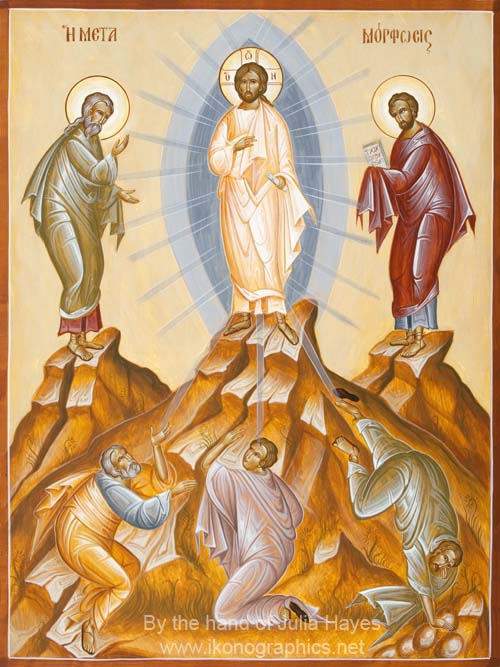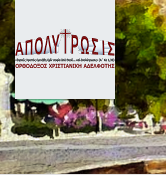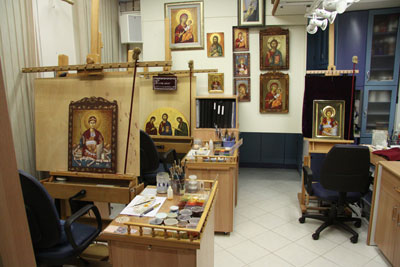Translated excerpts from the book:
Στεργίου Ν. Σάκκου [Read CV], «Λάμψον καὶ ἡμῖν...», ἐκδ. «ΧΡΙΣΤΙΑΝΙΚΗ ΕΛΠΙΣ» ΟΡΘΟΔΟΞΗ ΑΔΕΛΦΟΤΗΤΑ, Θεσ/νίκη 2023.
Called to His Eternal Glory
 The Feast of the Transfiguration is set as the last of the Lord’s feasts in the liturgical year. As the distinguished liturgist Ioannis Foundoulis notes, this position marks the conclusion of the yearly journey through the events of the Lord’s life. At the same time, it offers a glimpse into the events of the last times: the future coming of Christ, the glory that is to come, and the deification of the human person who is being transfigured in Christ. This is the final goal and purpose of the Savior’s redeeming work.
The Feast of the Transfiguration is set as the last of the Lord’s feasts in the liturgical year. As the distinguished liturgist Ioannis Foundoulis notes, this position marks the conclusion of the yearly journey through the events of the Lord’s life. At the same time, it offers a glimpse into the events of the last times: the future coming of Christ, the glory that is to come, and the deification of the human person who is being transfigured in Christ. This is the final goal and purpose of the Savior’s redeeming work.
The faithful are already drawing near to this future glory through their whole spiritual life, lived within the life of the Church. They are conscious of the truth expressed so vividly by the apostle Paul: “But our commonwealth is in heaven, and from it we await a Savior, the Lord Jesus Christ, who will change our lowly body to be like his glorious body, by the power which enables him even to subject all things to himself” (Phil 3:20–21).
In this present life, our body is a “body of humiliation”; it is subject to sickness, weakness, decay, and pain. But at the Second Coming, our Lord will appear in glory, and then our body will undergo a transformation. It will be stripped of all that is temporary, fragile, and incomplete, and it will be clothed with glorious perfection. It will become “conformed to the body of His glory”—like the glorified body of the God-man Jesus. “It will become like the body that sits at the right hand of the Father,” teaches Saint John Chrysostom emphatically, “like the body that is worshipped by the angels, attended by the bodiless powers—like the body that is above every principality, authority, and power!” The word “will transform” (μετασχηματίσει), notes Theodoret, does not refer to a mere change in outward form, but rather to the body’s deliverance from corruption. The body will be “conformed” to His glory, explains the same interpreter, not in the degree of glory, but in its quality: “for it too shall be radiant with light,” like a body made of light.
This astonishing and inconceivable likeness will be accomplished “by the power which enables Him even to subject all things to Himself.” The almighty Lord has the authority to subdue all things—therefore, He can also subdue corruption and death. He confirmed this hope by raising His own body from the dead.
Concerning this profound transformation that will take place at the Second Coming, we also read in the First Epistle to the Corinthians: “Lo! I tell you a mystery. We shall not all sleep, but we shall all be changed, in a moment, in the twinkling of an eye, at the last trumpet. For the trumpet will sound, and the dead will be raised imperishable, and we shall be changed. For this perishable nature must put on the imperishable, and this mortal nature must put on immortality” (1 Cor 15:51–53).
The apostle Paul reveals a mystery—something hidden—that will take place at the close of the ages: “We shall not all sleep (die), but we shall all be changed.” Not all will die, but all will undergo a transformation. The verb “we shall be changed” here carries the same meaning as “He will transform.” Those who are alive at the time of the Second Coming, the moment the Lord appears in glory, will instantly undergo a transformation. Their corruptible and mortal bodies will become incorruptible and immortal—like the glorious body of the risen Lord! “Corruption will die within them,” explains Saint Theophylact, “and will be transformed into incorruption.”
It is worth noting that, in that hour, the human being will not perish, and the unique personal identity of each will be preserved. Our self will retain the awareness of its own existence. Yet it will regain its lost radiance—the radiance it once had in Paradise before the fall. Just as our Lord, when He assumed human nature, preserved His divinity whole and unchanged—and thus was not mortal, but only liable to suffer—so too, at the Second Coming, the human body will be deified. It will not cease to be our very own human body, but it will be transformed. This same body will be changed and will become incorruptible, immortal, and glorious!
Knowing these things, then, O man,” cries out Saint Andrew of Crete, “do not make yourself unworthy of grace, nor lose the heavenly and eternal things because of a life of indulgence. Instead, put away all laziness of soul and free yourself from every earthly concern. Turn yourself completely toward what is above and heavenly. Embrace the spiritual union with the Word—a pure and blessed union—which brings deification and the enjoyment of inexpressible blessings. Bring your soul and your life there, near to Him. It is a good thing to be with God. That is where the feast of the saints takes place.









